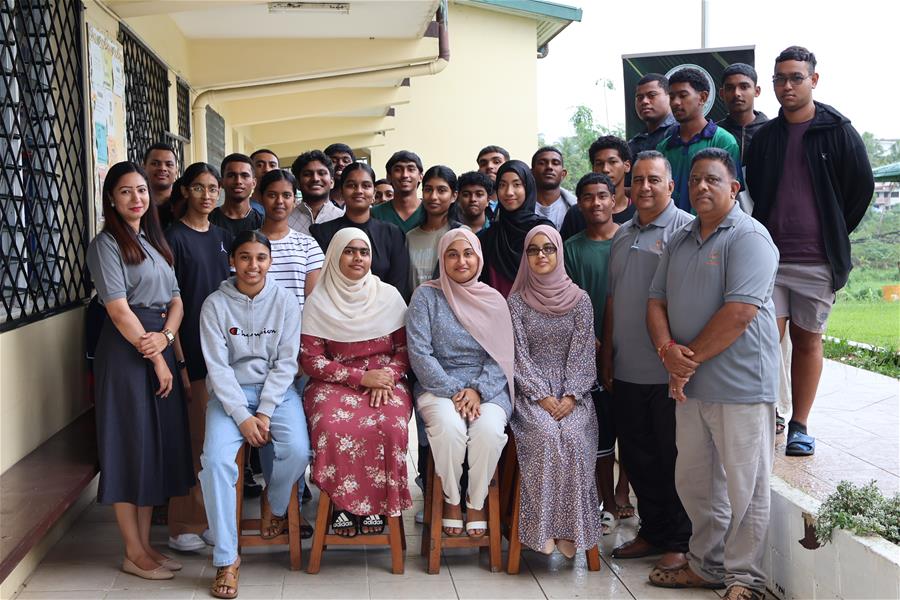SUVA, Fiji (28th August 2025): Suva Muslim College became the first secondary school in Fiji to implement the Land Transport Authority’s (LTA) Learner Driver Training Program for its Year 12 and Year 13 students.
The first Learner Driver Training Program session with 28 students was held yesterday at the school in Mead Road, marking an important step in educating young people on safe driving practices and responsible road use.
LTA Chief Executive Officer Irimaia Rokosawa highlighted the importance of reaching students early in their driving journey, as a Learner Permit in Fiji can be obtained by persons aged 16 years and 6 months, and above.
“Every year, lives are lost on our roads, and many of those involved are young drivers. To change this trend, we had to start early, in our schools, by giving students the knowledge and skills to become safe and responsible drivers. This training is not just about becoming drivers, but becoming safe and responsible drivers,” he said.
Mr Rokosawa explained that the program was designed to go beyond simply teaching technical driving skills.
“We wanted to instill discipline, respect for the law, and care for others. A driver must not only know how to operate a vehicle but must also appreciate the responsibility that comes with being behind the wheel.
“Every decision made on the road can save a life or cost a life, and our young people had to understand that,” the CEO said.
Mr Rokosawa commended Suva Muslim College for taking the bold step to set an example for others to follow.
He said the training session included theory components where students were taught road safety rules, road signs, and defensive driving techniques.
Students were also engaged in an introductory session to the Driving Knowledge Test System (DKTS), an integral test undertaken as one of the first steps to obtaining a Learner Permit from LTA.
“Driving is an essential skill, and by learning it in a structured way, students were more likely to adopt safe habits from the very beginning. I commend the school leadership for their vision,” he said.
Mr Rokosawa reminded students that obtaining a driver licence was not about convenience, but responsibility.
The CEO emphasised the important role young people played in shaping the future of road safety in Fiji.
“A driver licence is not just a piece of plastic; it is a commitment to safety. It means these youths have promised to respect the law, passengers, and every other road user. Never take that responsibility lightly,” he said.
“Young drivers set the tone for tomorrow’s road culture. If they embrace safe driving, others will follow their lead. The aim was for these young drivers to see themselves as role models — for their younger siblings, friends, even their parents would be influenced by how they drive and their compliance with road safety measures and adherence to traffic regulations,” Mr Rokosawa said.
Mr Rokosawa encouraged other schools to partner with the Authority and provide the same opportunity for their students.
LTA Manager Road Safety Education Watilala Fonu says road safety is everyone’s responsibility and young drivers could set an example to their elders and protect lives on Fiji’s roads.
Ms Fonu stressed that the program was more than learning to drive.
“Too often we have seen young drivers making dangerous choices because they never had the right guidance at the beginning of their driving journey. By engaging them before they even apply for their Learner Permit, we ensure they understand the rules, risks, and responsibilities of holding a valid driver licence,” she said.
“This was not only about preparing for a test. It was about creating safe habits that would stay with you for life. Every choice you make on the road has consequences—not just for you, but for your family, your passengers, and everyone who shares the road with you.”
Suva Muslim College Principal Shiraaz Ali said they were proud to be the first school to host the LTA Learner Driver Training Program.
He said the initiative would equip students with the essential skills to become responsible, safety-conscious drivers and it was encouraging to see them engaged and taking road safety seriously from an early stage.
Schools interested in participating in the program can contact LTA Manager Road Safety Education on email watilala.fonu@lta.com.fj
